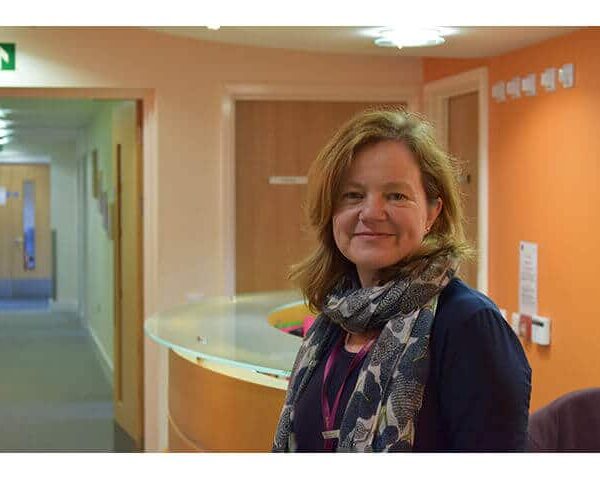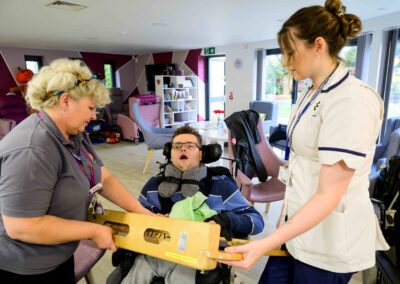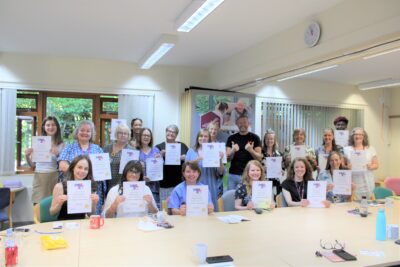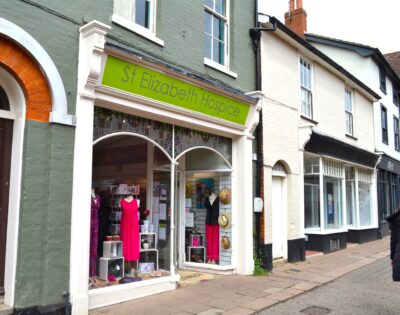Let’s talk about dying

It was back in 1991 when Community Manager at St Elizabeth Hospice Sarah Godfrey was working as a newly qualified nurse, that she first realised she wanted to be part of the conversation about end of life care.
I was in London, working a weekend shift in charge of a surgical / gynaecological ward; when I found myself looking after a lady in her early twenties. It was Friday and she had just come out of exploratory surgery regarding her fertility problems when I found her in the bathroom room, upset, worried and frustrated.
I sat with her as she told me what she had feared.
She was not able to have children.
She was devastated but could not have further news until Monday, when the consultant would see her.
I spent the weekend caring for her whilst knowing however, that the procedure she had undergone was one which meant that she had extensive cancer.
I couldn’t and wasn’t in a position to tell her the news myself, nor to talk about what this meant for her. It weighed heavily on me as I wanted to be honest and to have a proper conversation about her situation.
Instead, we both had to wait out the weekend.
Feeling inadequate
It was on the Monday ward round when she finally learnt what I had known since Friday.
I have never forgotten that feeling of inadequacy and of not feeling comfortable – of not being in the right position with the relevant skills and expertise to talk about dying.
I decided to do something about it. I wanted to acquire the skills to take on that conversation and to be in an environment where I could do just that.
What about me?
I decided to study for a degree, part of which included a section entitled: ‘What about me?’ which focused on the effects on nursing staff and the difficulty of talking about dying, as I wanted the knowledge to care for those who are dying and the skills to support it.
Even now, 26 years on, I keep going back to that weekend and how awful it felt having the guardianship of that knowledge for the whole weekend and being powerless to help.
For me, real professionalism is about holistically caring for the patient. It’s about being able to seize the moment and do what is right at the time; taking the opportunity to say what is needed.
It’s to be able to read each situation, make judgements and know the options available; only then are you able to accompany the patient in their journey of realisation.
Once I got involved in end of life care, it led me to working within the hospice movement.
A privilege
I worked as a community nurse specialist for 13 years. It is always a privilege to visit people in their own homes – their environment. It puts you in a completely different position when on your patient’s territory, than when it’s the other way around. It provides a way to see the world through their eyes.
In the community, it’s possible to really assess the position in which patients find themselves. You often don’t know what you may find but you do know that to hear their story; see their photos; meet their family and to weave in the whole context makes the whole relationship truly person-centred.
There is almost a forensic level of insight into a person available in a home environment; so many clues as to what is truly important and it is this which enables us to treat the whole person, to tailor that treatment to our patient on their terms and on their turf.
Make life the best it can be
My first experience of working within a hospice showed me straight away, the openness and honesty of working towards the same goal. It is about making life the best it can be for the time that we have. If we can make living with a terminal illness better; we can help make dying better.
To give someone the opportunity to sort out the things which are important to them: their symptoms; their pain; their relationships; their finances, keeps their dying personal, tailored by them, for them. We all need space and security in which to sort out our lives and this is even more important in the heightened intensity of end of life.
For me, and community nurse specialists like me, to be that enabler is truly valuable. We work alongside other Health professionals and we stay with each other in a relationship of co-dependency.
In my current role as Community manager, I see that there are so many people in our community of East Suffolk who can benefit from hospice care and upon whom our service could have such an impact. I am the ‘translator’ between the hands-on community nurse specialist role, knowing what it feels like to be the nurse but also seeing the big picture; the service development needs and finding the strategies to make it work well.
Building the future
Here, at St Elizabeth hospice, I use my knowledge to understand and to influence future change and care for patients. There is a ripple effect created by our team in the community.We enable patients to make choices, whatever they are, which leads to life being lived well, right up until its end. Our effect spreads widely to a huge number of people, including: doctors, district nurses, GPs, carers and families, for whom we identify need; enable and support.
With a national shortage of nurses, we need to future-proof this vital service.
We need to build a future.
To find out more about how you can sponsor a nurse at St Elizabeth Hospice



